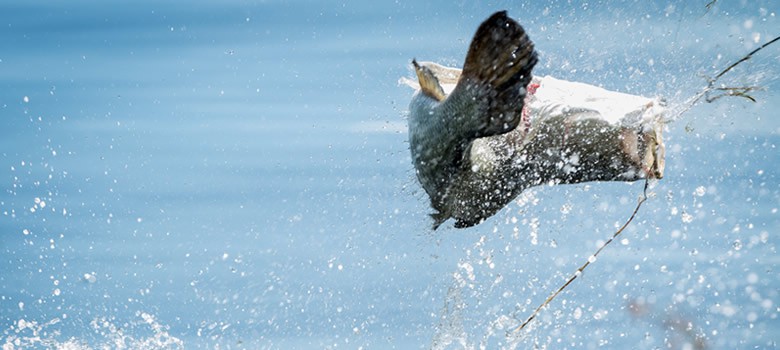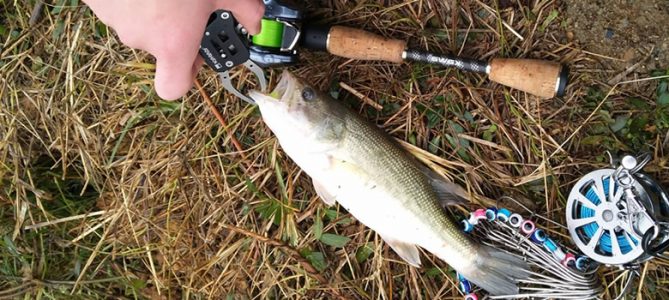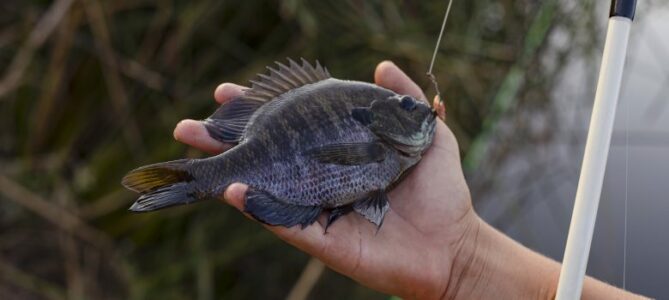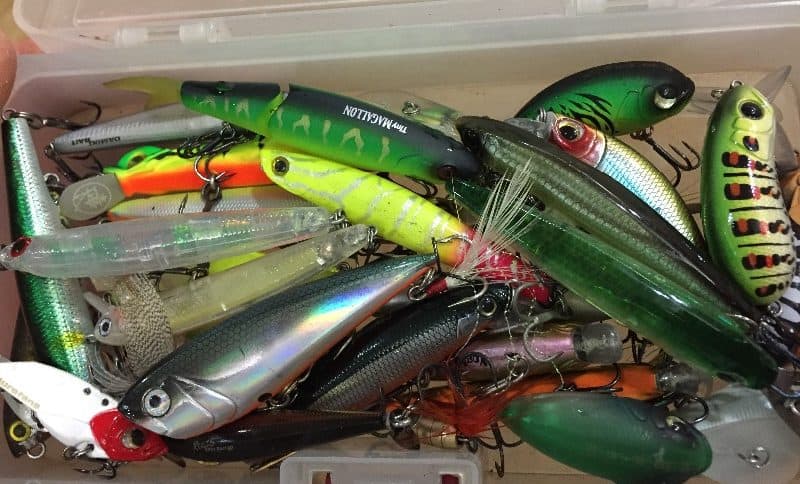If you buy via a link on this page, we may receive a commission, at no extra cost to you.Learn more
Bass is arguably the most targeted fish there is. Fishing for it takes preparation. But it is a rewarding experience. For instance, you have the opportunity of landing a trophy-sized bass. You can even be so lucky to see it leaping outside the water, something that is not that common.

Yes! Bass do jump out of the water, although it is not a regular practice.
So, it begs the question: Why do bass jump out of the water? They jump because of one of two things: To eat or to escape from a predator.
But that’s the short answer. You can bear with us a little longer and discover the reason behind this strange behavior.
Jumping to Escape
As we already declared, bass leaps out of the water to flee from a predator, including yourself.
Among the rare times bass jump out of the water, this is the most uncommon reason. However, they use this ability as a defense mechanism. You would do the same in their shoes, or should I say fins?
When bass are being pursued by a predatory fish, they will do all within their power to escape the predator’s mouth. This includes jumping. With a simple jump, they can confuse their hunter and avoid a fatal attack.
Yes, you read that right. Jumping out of the water buys bass a couple of seconds that will confuse any predator fish. I mean, imagine being after something that suddenly disappears before you. Something like that will surely throw you off. In addition, it helps them to prevent mortal attacks. You see, not all fish master such an ability. Thus, it is a great way to escape from certain death.
You Got Them Hooked. What You Would Expect?
As soon as you cast your rod expecting to hook a bass, you become a predator to them. So, it is not strange when they lead out of the water to shake the hook off their mouths. Unluckily for you, this is an extremely effective technique.
Leaping out of the water most times releases the pressure on the line. In other words, it leaves some slack on the line that the fish takes advantage of to spit the hook out. Besides, most anglers, especially beginners, tend to point the rod’s tip to the sky while reeling. This only increases the chances for bass to jump out of the water.
That’s why you see many anglers facing the rod to the water. This way, you can reel fish without driving it to leap out of the water. It is like you were walking the fish as you would with a dog. Using this technique allows you to keep the line as tight as possible. As a result, you will keep constant tension in the hook, driving it deeper into the fish mouth.
How to Keep Bass Hooked As They Jump?
Well, If you are paying attention, you might already know the answer to this question. However, we will repeat it once more: Keeping the line tight.
The only thing that bass can do to escape is snap the line by sheer force or rub it against a rock or tree.
Anglers use different methods to keep the line tight. We already mentioned one: Pointing the rod tip towards the water. This way, the line will remain somewhat parallel to the fish, making a jump less likely. Nevertheless, keep an eye out at all times. See where the bass is heading and whether there is some slack in the line.
The other approach is to keep the rod’s tip at 12 o’clock and lower it as you reel. It is easier than the latter. But it makes the bass more likely to jump.
Why Are Bass More Likely To Spit The Hook When Jumping Out Of The Water?
Water is denser than air. It also has a higher viscosity. That’s why it is harder to move underwater. In other words, water poses a greater restriction to movement than air does. So, when fish leap out of the water, they can shake their head more violently because there is less opposition. As a result, they are more likely to spit the hook. That’s why the line must remain as tight as possible.
Jumping to Eat
The second and most common reason a bass has to jump is food. You see many things that bass eat, such as frogs and bugs, are close to the surface. So, it is not a surprise to see them leaping out of the water in an attempt to catch prey. Some bugs might not even be in the water at all. I’ve seen bass jump to eat a bug from a tree branch or leaf that’s close to the water.
However, this doesn’t happen all the time. We’ve found that this happens the most during early mornings and dusk. There are two reasons for this. The first is because bass are more active during these times. You can learn more about it here, where we cover which is the best season and time of day to fish for bass. The second reason is that bugs usually fly close to the surface. So, it is the perfect mixture, as you can see.
Is It Good For Fishing?
Sadly, there is not a single answer to this question as it depends on why bass are jumping out of the water. Let’s say, for example, that they are escaping from a predator. In this scenario, it is not a good thing for fishing. You see, bass will show little to no interest in your lure if they are being chased by a predator.
On the other hand, if bass are jumping out of the water to find food, it is a good thing. This means that they are actively feeding and they are in shallow water. Nevertheless, keep in mind that landing a fish that jumps is not easy. You must keep the line tight at all times. Otherwise, the fish will spit the hook.
How Do I Catch A Bass That’s Jumping?
The trick here is to remember that if a bass is jumping, it is likely lurking in the shallows. Therefore, the logical approach is to use a topwater lure. Frogs, buzzers, and poppers are all suitable. We’ve embedded links into the words so you can check our topwater and frog suggestions.
Another option, although difficult, is to catch bass mid-flight. You can use a net for this. But it is not as effective as using a topwater lure. Still, it might be much more fun.
Another way, which is as unlikely as the latter, is to hold the bait in the air. This way, you can force the bass to jump out and catch the bait. Again, it is not as effective as using a topwater lure and keeping the tension on the like.
How Long Can Bass Survive Without Water?
Although a jump lasts a couple of seconds only, fish can survive up to 10 minutes outside the water. Some species could withstand more time than others. The landing surface also influences that time. For example, if the ground is hot and dry, the life expectancy out of the water is shorter.
Jumping Bass: Seeking Food or Escaping
Although bass don’t jump as often as other fish, they still do. There are two reasons for this behavior. They are either escaping from a predator or chasing food. Generally speaking, it is better for fishing if they are jumping to catch some food. They will show little interest in your lure otherwise.
So, if you see bass leaping out of the water, we recommend throwing topwater lures. This way, you can take advantage of the feeding frenzy and the fact that bass are shallow. But hooking them is just the first step. You must try your best to keep them from jumping. That’s why we recommend pointing the rod’s tip towards the water. The line will sit parallel to the surface, making jumps less likely.
The last thing that you must do is to have your camera ready. There is nothing better than a shot that shows the man versus nature struggle than fishing is.




